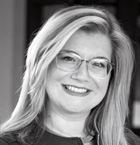Cashing in on Good Habits

Four tried and true habits for creating money mastery
By Amy Persyn
Not all habits are bad. When it comes to financial wellness, having responsible money management habits can help you achieve your goals and have a brighter financial future. These four habits help you manage your savings and spending to make the most of your money.
Stop acting on impulses.
Some of us love to live for the day. Some of us find comfort in minimizing our risks and planning our moves calculatingly. This can also apply to money. When it comes to individual buying behaviors, acting on impulses can be a challenge for realizing financial health. That’s where creating a habit around how you evaluate impulse buys comes into play.
HABIT: Set a threshold for an unplanned buy. The threshold can vary depending on your budget. For me, my rule is that if there is something that I didn’t plan for, and it is over $200, I require myself to take a focused look at it. I think about it to be certain that this larger purchase is more than just a whim. I have a variety of factors I consider to ensure a purchase is worth the swipe of my card: Is it useful? Does it add value? Will I need to pull funds or use credit to make this purchase?
If you are still unsure about the purchase, wait it out. Sleep on it and make sure it is in fact in line with your goals. You can also try asking yourself if you need it or want it. If you still wish to purchase after that, test yourself by asking if you need it NOW. If you won’t use it within the next week, don’t buy it.
Remember: Little purchases (at several stores) and adding recommended items to your online cart can add up to budget busters. A little bit here and there can take you away from your goals and bring little to no value to your life. Why stay in debt or forgo the good things in life over the dollar bin by the check-out? Cashing in on Good Habits Four tried and true habits for creating money mastery By Amy Persyn
Use credit cards to take advantage of perks – but don’t let them get the best of you!
For some people, having a credit card might make you feel like you have a higher spending budget. This is something many Americans struggle with, especially when they’re younger.
HABIT: When you use your credit card, make a transfer of the amount from your checking account right to the card. Don’t wait – do it when you get home, or make the transfer directly using your mobile app. You don’t want to forget or justify letting the balance go because your checking account looks better than it should.
Why use a credit card instead of just paying from your account? There can be perks to using your card. Perhaps you can earn a reward for swiping, or earn cashback. Cashback can be a great way to pad a savings account, or you can rack up your rewards to use the perks to fund purchases, trips, and more. Using your credit card can be a way to take advantage of smart money management skills and prop up your credit score!
Plan for the unexpected influx.
As a kid, the board game LIFE was a favorite of mine. As in the game, sometimes the windfall of unexpected cash comes our way. It’s helpful to have a healthy habit for when extra cash finds its way to us. No, I’m not talking about winning the Powerball, but rather those occasions when you receive a lump sum of money that isn’t accounted for in your monthly budget. This could be a tax refund, a rebate on a purchase, a jackpot win at your bowling league, or a bonus at work.
HABIT: Whatever the source of the windfall, commit to saving no less than half of that amount instead of allowing your “wanting” tendencies to take over. Many people tend to look at this scenario as a freebie and spend the whole sum, but ideally, you will save more than half. The idea is to save in any way that is right for your goals but, If you have enough set aside in emergency savings, put that amount toward a long-term goal like a vacation or a big purchase you are planning. If you are a really savvy saver and have more than enough and have more than enough saved for an emergency, dd the funds to a less liquid option so that money can grow over time. What about the other 50%? If you have any debt, use the money toward paying down a balance. Making an extra mortgage payment never hurts!
Set it and forget it!
Technology has come a long way and these days, many banks offer accounts and online tools which allow you to set up automated ways for you to save money. I have accounts set up for different purposes such as vacation, childcare, and emergency. Some accounts are connected to my primary checking account with transfers scheduled with each paycheck. Doing this gives me a clear picture of my checking account’s available balance to pay bills and use for fun. I even have accounts set up outside of my primary bank to transfer a portion of my payroll for investing on a small scale outside my company plan.
HABIT: Force the habit and let the system do it for you! It’s not how much you save, but the ease of saving with a “Set it and forget it” strategy. Setting up auto-transfers for your money allows you to minimize the risk of not putting some aside and you learn to live off of what you have remaining after saving for your goals.
 Amy Persyn is a lifelong Macomb County Resident. She is passionate about connecting families and entrepreneurs with information that can help them become empowered and financially literate.
Amy Persyn is a lifelong Macomb County Resident. She is passionate about connecting families and entrepreneurs with information that can help them become empowered and financially literate.

